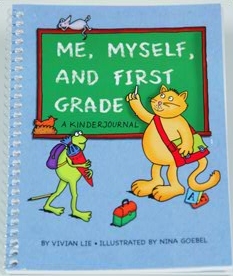When my daughter started school in Germany, she was given a traditional Schultüte – a cone which is filled with useful things like stationary and books, and also some less useful things like sweets.
Time seems to have flown by since then, as that was 200 days ago!
When I first blogged about this particular tradition, I received a comment from a company called KinderCone in the USA that sells the same type of cones there – bringing the tradition to America.
Renewing the contact a few weeks ago, I found out that the cone is not just delivered empty (as in Germany), but also contains amongst other things a KinderJournal called “Me, Myself and First Grade”, and Vivian from KinderCone was kind enough to send my a copy to look at.
 “Me, Myself and First Grade” is a journal of a child’s first year at school. It starts by introducing Karli the Cat, who accompanies the child through the book.
“Me, Myself and First Grade” is a journal of a child’s first year at school. It starts by introducing Karli the Cat, who accompanies the child through the book.
Each page contains an activity for the child to do, which in turn documents that precious first year. The text is kept simple, and there is a mixture of spaces to write in, boxes to tick and pictures to draw. I particularly liked the idea of the space for writing your name – one box for the beginning of the year, and one for the end so that you can compare how the handwriting has improved.
So not only does a child practise writing in a book that will be special for the rest of their life, but it also gets them to think about their time at school: what are they good at? What do they like best at school? Everything that they read and do is positive. There is even a special page to celebrate the first 100 days of school.
It’s the sort of book that I would like to see available in Germany, except that I’ve never seen anything like it here.
A word of warning to British readers: the book is obviously written for the US market, so expect words like “grade”, “recess” and “candy” (for school year, break and sweets). I would also point out that the story about how the Schultüte came into being is not something that everyone in Germany agrees on, and the book – understandably – only gives one version of the story.
But all of that probably doesn’t matter to the children. For them it is a nice surprise on their first day of school, and it’s nice to see a local tradition spreading to another part of the World.
Remember, the book is included when you buy a KinderCone, so if you want one you’ll have to go to the KinderCone shop.
